Latest Aleph.im News
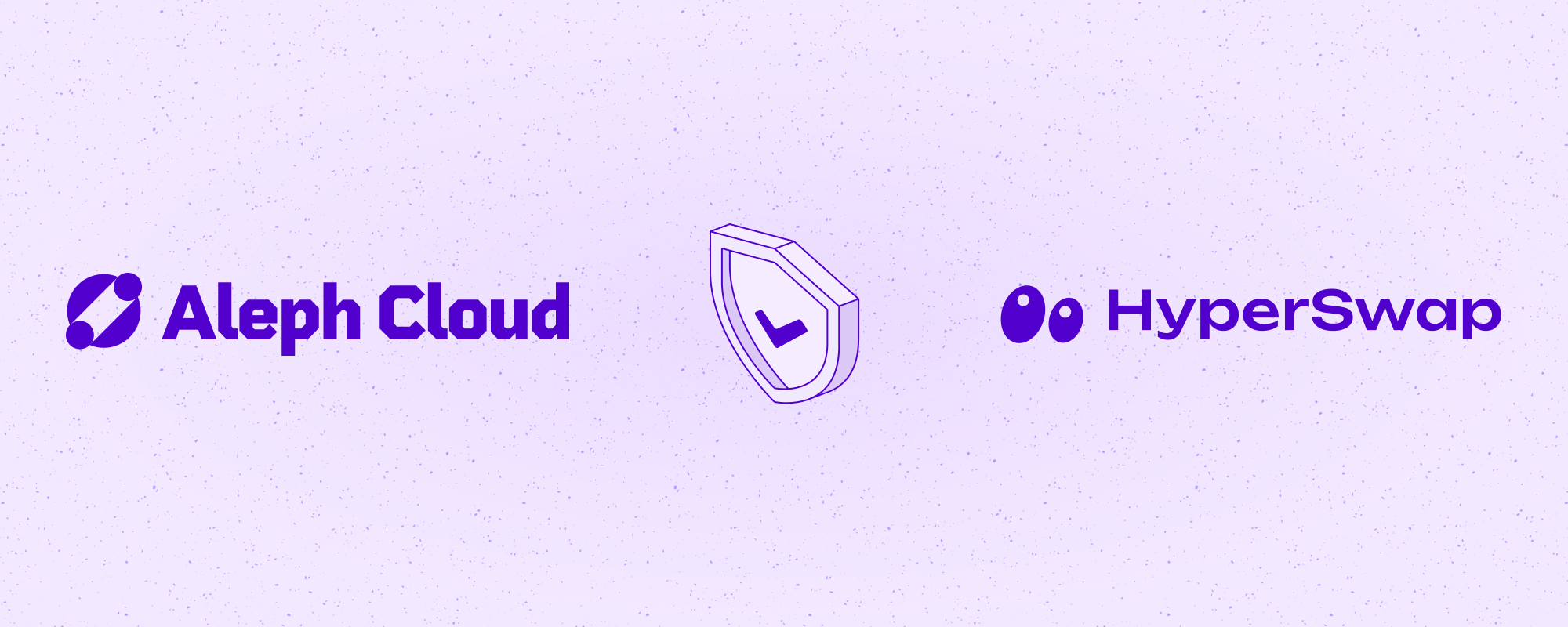
11 days ago
How Aleph Cloud helped HyperSwap mitigate a DDoS attack
On the night of May 5th to 6th, HyperSwap was hit by a massive DDoS attack that impacted both their website and application. As HyperSwap was already using some of our cloud solutions, we quickly stepped in to support them migrating their front-end and redirecting the attack traffic to mitigate its effects.
## TL;DR
* Implemented a custom anti-DDoS solution
* Our team reacted immediately
* Aleph Cloud services remained fully operational
HyperSwap's infrastructure initially lacked a proxy and did not have sufficient protection against DDoS attacks. However, they had deployed a fallback version of their application via IPFS, pinned on our network, in case their main servers were compromised.
Unfortunately, on the night of the attack, HyperSwap’s main server was overwhelmed. While the API remained live, its performance degraded significantly. Their team redirected traffic to our network in an emergency move, which caused some turbulence before we could fully respond.
Meanwhile, our dev team activated our internal anti-DDoS system, offloading attack traffic to a black hole and stabilizing the situation.
> The Aleph team quickly stepped in to support us by ensuring the IPFS-hosted version was accessible, allowing users to continue accessing the app while we worked on mitigation. At the same time, the Imperator team, with their experience in indexing and handling high-throughput environments, acted swiftly and effectively. They immediately understood the situation and deployed the necessary resources to counter the attack, setting up new proxies, implementing alert systems, and reinforcing our infrastructure. — HyperSwap's CTO
On our side, we helped the HyperSwap team migrate their website to our internal anti-DDoS platform and redirected the attack to a black hole. This incident marked the first successful deployment of [Aleph Cloud](https://aleph.cloud/)’s experimental anti-DDoS solution, developed to protect decentralized applications from targeted disruptions.
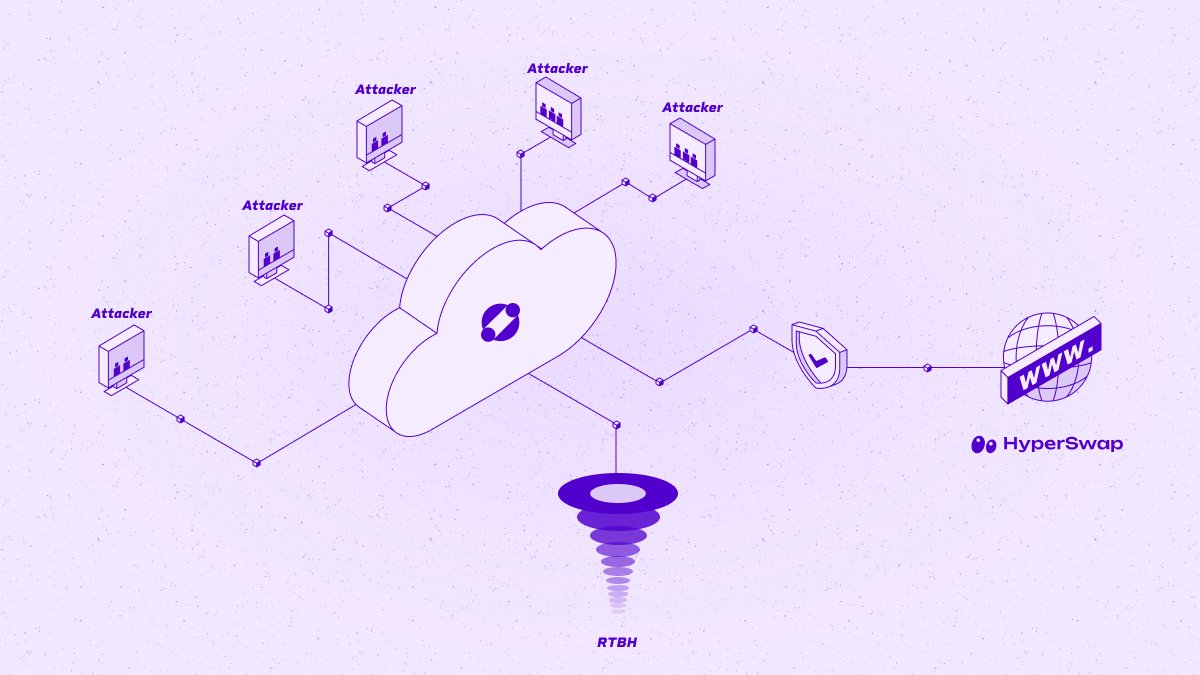
What Is a Remotely-Triggered Black Hole (RTBH)?
RTBH filtering is a network security technique used to mitigate DDoS attacks by redirecting malicious traffic to a null route, effectively making it disappear. Think of RTBH as a trapdoor at your network's entrance: when a flood of harmful traffic is detected, RTBH diverts it into this black hole, preventing it from reaching or slowing down the network and its users.
## What’s Next?
HyperSwap plans to deploy their APIs on Aleph Cloud to create a fully decentralized version of their application, one that’s resilient to future attacks.
We will continue to develop and improve our anti-DDoS solution, which proved effective in this real-world test. This successful mitigation highlights the power of decentralized infrastructure to deliver security, resilience, and true censorship resistance.
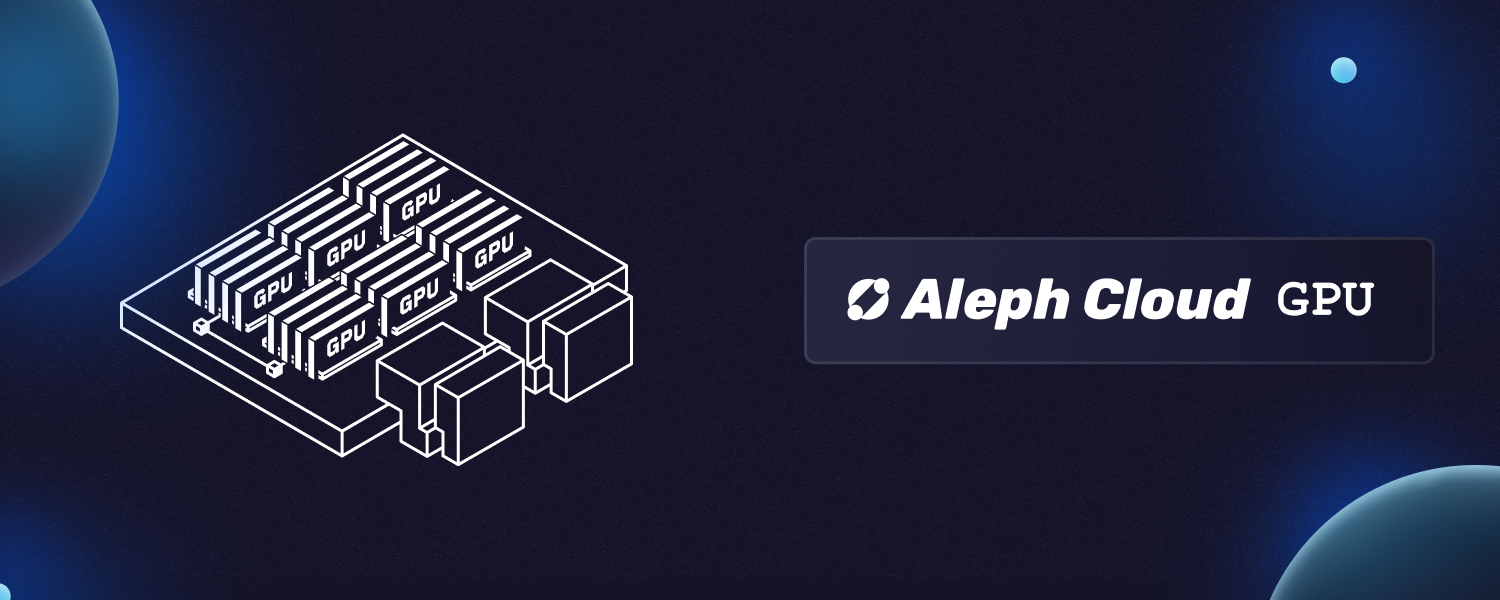
3 months ago
Unlock unparalleled computing power with GPUs on Aleph Cloud
GPUs are now integrated into [Aleph Cloud](https://aleph.im/), providing high-performance computing for AI services, rendering, gaming, AI agents, and more.
We are proud to announce a significant milestone for our decentralized cloud ecosystem with the latest integration of GPUs. The new Aleph Cloud Core Channel Node application introduces GPU integration, a transformative feature that positions Aleph Cloud as a powerful and more competitive solution for high-performance computing needs. In addition, this release brings account management capabilities, pricing estimations, and a host of performance improvements, making Aleph Cloud an even more robust platform for developers and enterprises alike.
With GPU support, users can now unlock unparalleled computing power for tasks such as AI training, rendering, gaming, and running AI agents. By leveraging decentralized infrastructure, Aleph Cloud offers both scalability and flexibility at highly competitive prices, all through the convenience of a Pay-as-You-Go (PAYG) model using ALEPH tokens.
# Revolutionizing cloud computing with GPU integration
The integration of GPUs into Aleph Cloud marks a pivotal step forward. By enabling access to both consumer-grade and enterprise-grade GPUs, users can now select the exact resources they need through our intuitive interface at console.twentysix.cloud. This empowers them to scale their workloads seamlessly, whether they are building machine learning models, rendering complex graphics, or powering cloud-based gaming platforms.
Each GPU model is paired with specific vCPU, RAM, and disk allocations, ensuring peak performance for any workload. For example, an RTX 4090, ideal for gaming or smaller AI projects, will cost around $240 per month*, while an enterprise-grade H100, designed for data-intensive operations, costs approximately $1,920 per month*.
# Enhanced Pay-As-You-Go model
Aleph Cloud’s PAYG model is designed to offer flexibility and cost transparency, a critical advantage for businesses and developers. With ALEPH tokens as the exclusive payment method, users can enjoy a seamless payment experience across blockchains like Base, and Avalanche. This ensures not only affordability but also accessibility to a global audience.
Additionally, when a user provisions a GPU-powered virtual machine and initiates a payment, the system will automatically create two payment streams. 80% of the payment will be allocated directly to the node operator providing the compute power, while 20% will contribute to the Aleph Cloud treasury. This model ensures a fair and sustainable distribution of resources, incentivizing node operators while also reinvesting in the continued growth and development of the Aleph Cloud ecosystem.
The pricing structure is straightforward yet highly competitive. For instance:
* Consumer GPUs like the RTX 4090 are priced at ~$111 per month, while an RTX 4000 ADA costs only ~$55 per month*.
* Enterprise GPUs such as the A100 and H100 are geared towards intensive tasks, priced at ~$875 and ~$583 per month*, respectively.
This transparent structure enables users to budget accurately, scaling their resources as their projects evolve.
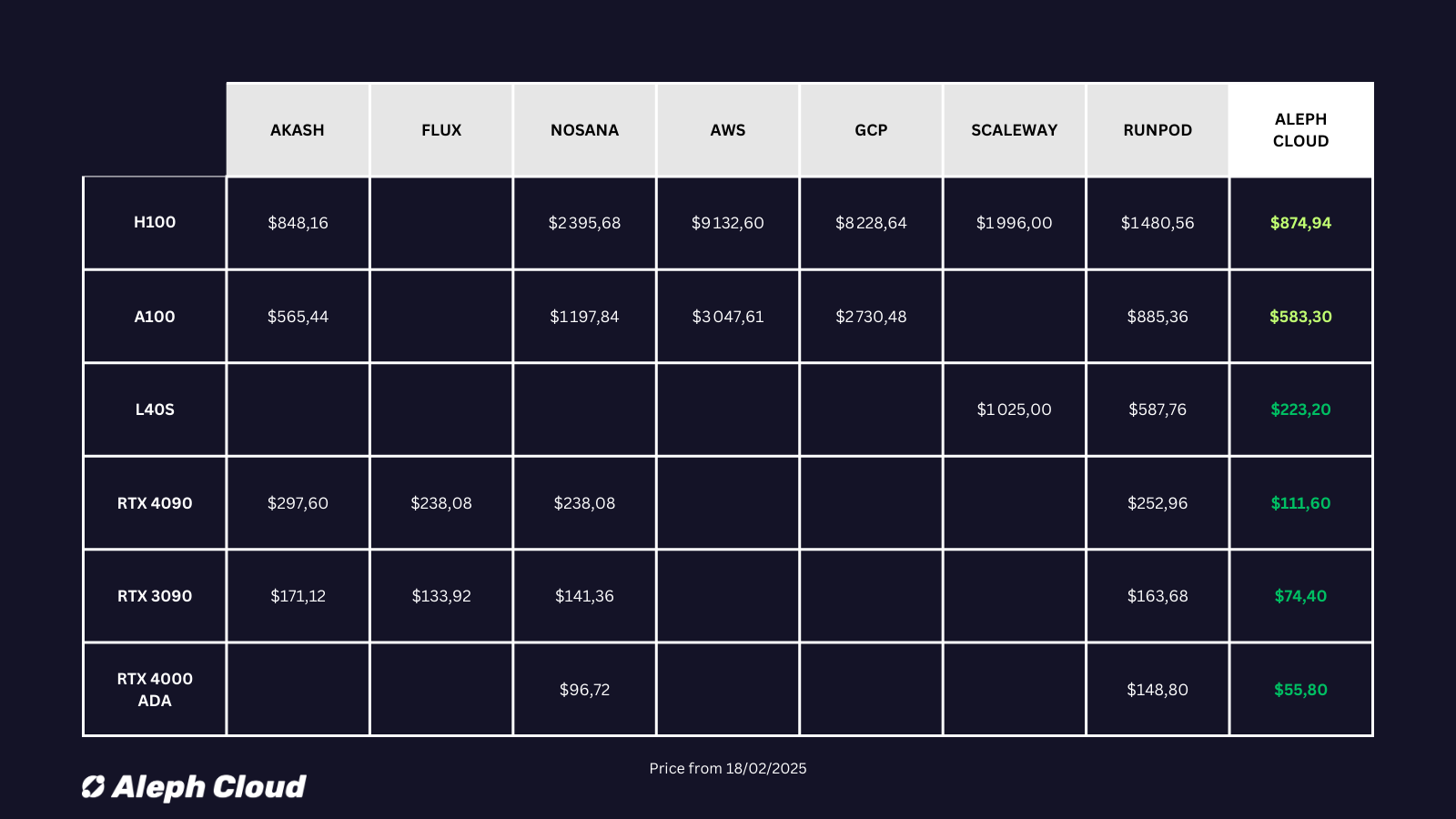
Pricing breakdown as of 18/02/2025
# New features for an optimized user experience
In addition to GPU integration, this release introduces several features aimed at enhancing performance and usability. Among the key highlights:
* Aggregates caching: By implementing caching for owner aggregates and metrics data, the platform now offers faster response times and smoother performance.
* Pricing estimation: Users can now estimate the cost of executable messages before sending them, providing greater transparency and control.
* Pre-calculated balances: This feature significantly improves system performance by reducing computational overhead.
* Cost service updates: The cost service now uses pricing aggregates for more accurate estimations.
These enhancements collectively make Aleph Cloud more reliable and user-friendly, reinforcing its position as a leading solution for decentralized cloud computing.
## Unlocking new use cases with GPUs
The addition of GPUs extends Aleph Cloud’s capabilities to serve a diverse range of industries and applications:
* AI and machine learning: Train and deploy machine learning models faster and more efficiently.
* Rendering: Create stunning visual effects and high-quality 3D graphics with reduced rendering times.
* Gaming: Deliver seamless, high-performance experiences for cloud gaming platforms.
* AI agents: Power advanced AI agents with robust, decentralized computing resources.
These use cases showcase the versatility of Aleph Cloud’s GPU offering, making it a compelling choice for developers, creators, and businesses alike.
# Looking Ahead
The release of GPU integration and the accompanying features represents a significant leap forward for Aleph Cloud and its community. As we continue to enhance our platform, we remain committed to empowering users with the tools they need to innovate, scale, and succeed in a decentralized world.
To explore these new features and start leveraging GPUs on Aleph Cloud, visit [console.twentysix.cloud](https://console.twentysix.cloud/computing/gpu-instance/) today. For more updates, follow us on Twitter and join our Discord community. Together, let’s redefine the future of cloud computing.
*Those pricing are converted in USD from the current price of ALEPH token. This data should evolve in time*
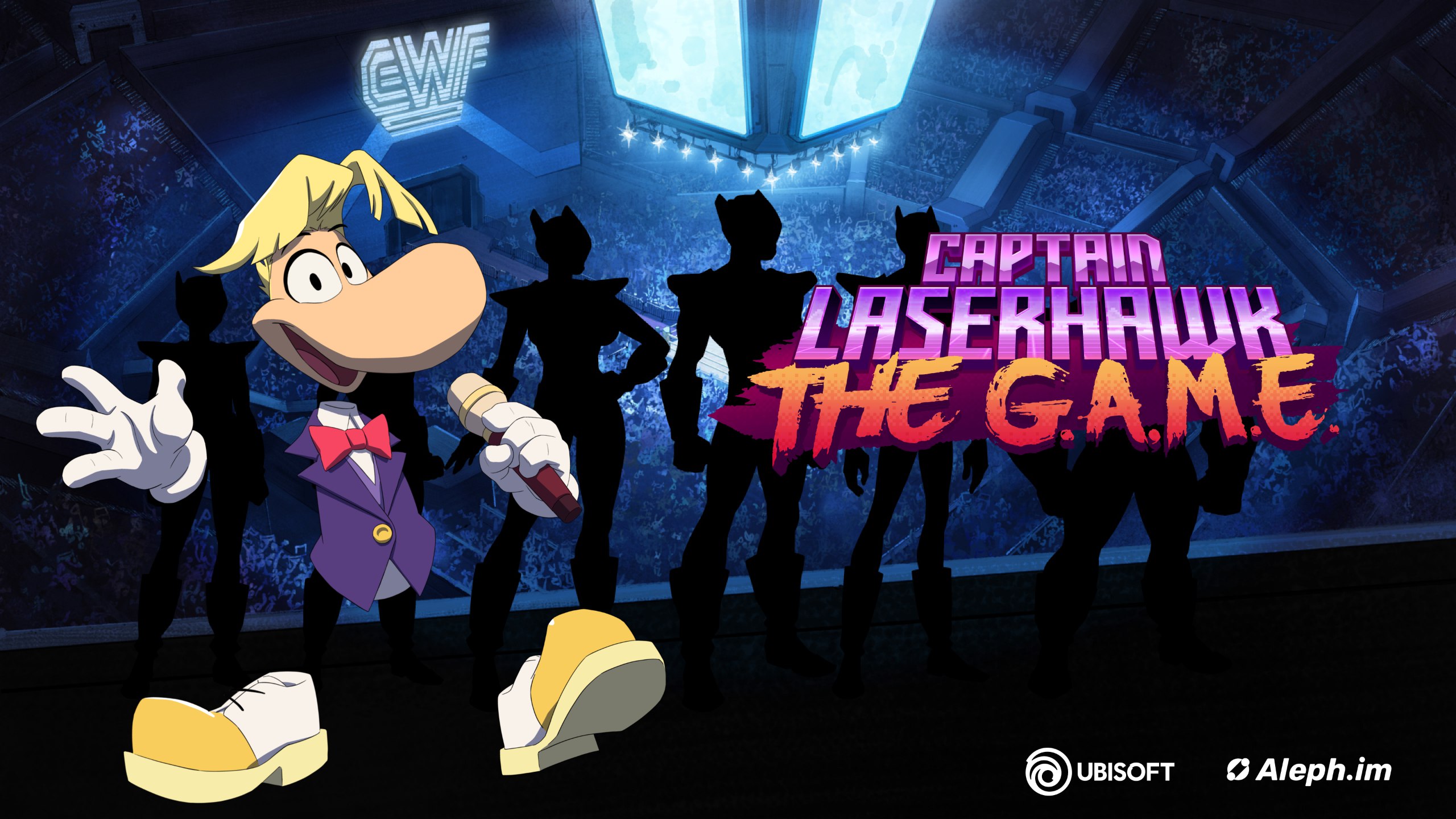
5 months ago
Aleph.im Brings Dynamic NFTs to Life in Ubisoft’s Captain Laserhawk: The G.A.M.E
PARIS - [Ubisoft](https://www.ubisoft.com/en-us/) is taking its Web3 gaming vision to new heights with [Captain Laserhawk](https://edenonline.ubisoft.com/): The G.A.M.E., leveraging [Aleph.im](https://aleph.im/)’s decentralized infrastructure to introduce dynamic NFTs that evolve with player engagement. This marks Aleph.im’s third consecutive integration into Ubisoft’s web3 gaming titles.
### About Captain Laserhawk: the G.A.M.E.
Expanding the universe of Captain Laserhawk: A Blood Dragon Remix—Ubisoft’s Netflix series—Captain Laserhawk: The G.A.M.E. is a groundbreaking multiplayer adventure that empowers its community to influence the narrative.
Set in the dystopian world of Eden, a totalitarian regime replacing the United States, players assume the roles of citizens navigating challenges both in-game and across external digital channels. By increasing their citizen score, players gain influence over the evolving storyline, creating an unprecedented transmedia gaming experience.
### Ubisoft in-game NFTs powered by Aleph.im
Aleph.im is a pioneer in decentralized cloud computing, providing essential infrastructure for dynamic NFT metadata, verifiable randomness, and decentralized data storage. Aleph was amidst [Ubisoft’s Entrepreneur Labs](https://www.ubisoft.com/fr-fr/company/about-us/innovation/startup-programs/lab) cohorts, and the gaming giant has been leveraging and supporting Aleph’s decentralized solutions as a node operator. Dynamic NFTs were first introduced in joint collaboration, transforming static digital assets into interactive, playable features. Aleph’s [dynamic NFT technology](https://www.globenewswire.com/news-release/2021/12/21/2356156/0/en/Aleph-im-partners-with-Ubisoft-to-bring-playable-NFTs-to-AAA-games-for-the-first-time.html) was subsequently integrated into Ubisoft’s Web3 game Champions Tactics™ Grimoria Chronicles.
*“We’re proud of our long-standing partnership with a world-renowned game publisher, supporting their vision to push the boundaries of Web3 gaming,”* said Jonathan Schemoul, CEO of Aleph.im. *“By integrating dynamic NFT capabilities and Aleph’s serverless architecture, Ubisoft is redefining player interaction and ownership in the gaming industry at large.”*
Ubisoft's Captain Laserhawk: The G.A.M.E. introduced the Niji Warrior ID collection, a series of 10,000 NFTs minted on Arbitrum. These IDs function as dynamic governance tools, granting holders early and full access to the G.A.M.E.’s features, exclusive rewards, and the ability to influence the project’s future direction. As players advance, their Niji Warrior IDs evolve to showcase achievements and unlock unique customization options, perks, and governance privileges—blurring the lines between identity and gameplay. Aleph’s serverless architecture hosts the metadata for the NFTs, leveraging a distributed database to store ID card information and enabling seamless updates to reflect player progress dynamically.
*"Aleph.im has been an invaluable partner, allowing us to seamlessly manage dynamic NFT metadata while maintaining transparency and decentralization,”* said Didier Genevois, Executive Producer and Technical Director, Ubisoft.
This partnership cements Aleph.im as the cornerstone of Ubisoft’s Web3 gaming infrastructure, supporting titles like Champions Tactics. Ubisoft’s commitment to integrating decentralized cloud infrastructure ensures that its gaming ecosystems remain secure, fair, and innovative.
Signup for latest DePIN news and updates